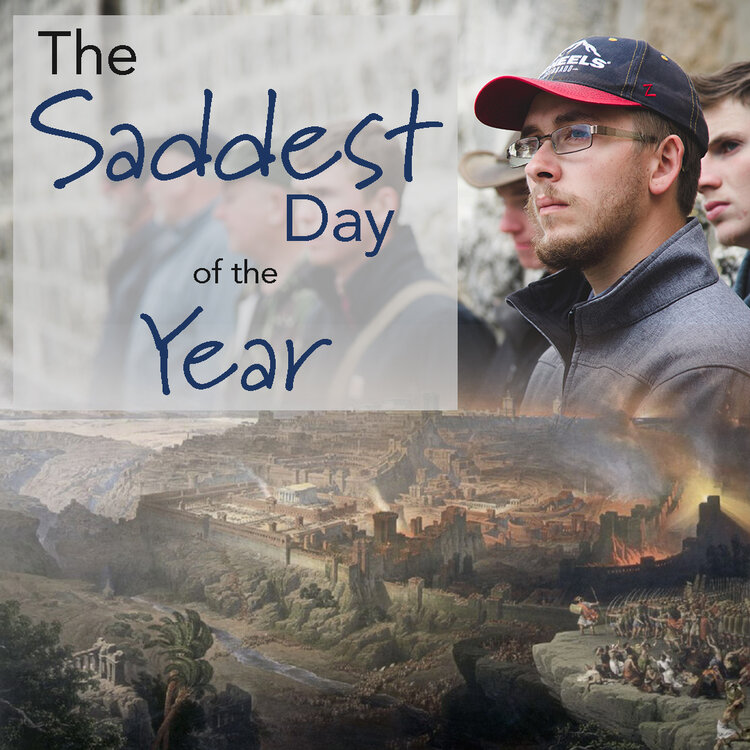Today is considered to be the saddest day of the year on the Hebrew calendar, even more so than Yom Kippur (Day of Atonement). Why? Today is the 9th of Av, a day on which both temples were destroyed as well as a day which marks a remarkable number of other tragedies that befell the Jewish people over the last several thousand years.
Being here in Israel, we take the opportunity to ascend the Temple Mount in Jerusalem as often as we can. This year, when Rabbi Yehuda Glick extended an invitation to ascend the Mount on the 9th of Av, we quickly made plans to join him.
I rose early and got dressed, skipping breakfast so that I could join the fast in unity with our Jewish brothers. I woke my three-year-old son, and together we loaded into the vehicles with the rest of the team and headed to Jerusalem. As we drove, I pondered what I wanted to experience while on the Temple Mount this year. Normally while there, I pray that the Temple would be rebuilt, that Israel would be restored, and that the Messiah would come. Today however, I knew we were commemorating the tragedy of the temple being destroyed. This day is specifically set aside to mourn the destruction of God’s house. I decided that I wanted to really imagine what that was like.
We arrived at the entrance of the Temple Mount about a half hour before we were scheduled to go up. I was somewhat surprised to see several hundred Jewish people lined up at the entrance, waiting for the gate to open. Several years ago, the Temple Mount was not even open on the 9th of Av! After our group entered the plaza area, we had to wait for a few moments while our police escort was assembled. While we waited, several other police officers passed us, leading four Jews toward the exit. It was clear that they were being expelled from the Temple Mount for doing something that was not allowed. I found out later that their “crime” was prostrating themselves in prayer. They simply laid down on the ground facing the direction of the Holy of Holies and were immediately arrested and removed from the site.
As we began our walk around the plaza, surrounded by a group of Israeli policemen, I began to imagine what the Temple Mount would have looked like two thousand years ago. Instead of border police officers guarding our group from Muslim extremists, there would have been Jewish zealots, guarding the Temple courtyard from the attacks of the Romans. Instead of the Dome of the Rock and the Al Aqsa mosque with its worshippers praying to Allah, there would have been a beautiful temple, inviting pilgrims to worship the God of Abraham, Isaac, and Jacob.
As we rounded the plaza, several of the Jews in our group openly prayed and spoke to our group about the importance of the day. One of the more passionate men burst into tears at several points during our visit, visibly moved as he gazed and prayed toward the spot where the temple should be. I even heard another group loudly praying the “Shema Israel” prayer in unison! The police were very gracious in allowing prayer, songs, and teaching throughout the visit.
As we paused at our last stop before being politely escorted to the exit, I gazed at the Dome of the Rock while standing beside my three-year-old son. I tried to imagine what that day must have been like when the Romans finally broke into the Temple courtyard. I pictured Roman soldiers chasing down Jewish zealots and slaughtering them mercilessly. One of the soldiers hurled a blazing torch through an opening in the temple. When the Roman commander Titus saw the beauty of the place, he tried to stop the blaze, but it was too late.
The temple was burned and the Romans dismantled the structure until there was not one stone left upon another.
You might wonder, “What does all of this have to do with me? Why should I care about Jerusalem, and why do we even need a temple there?”
Just before our Messiah died, He wept over Jerusalem. When cleansing the temple, He quoted Isaiah the prophet when He said, “My house shall be called a house of prayer for all nations!” (Isaiah 56:7) Afterward the disciples remembered what was written: “Zeal for Your house has eaten me up.” (John 2:17)
After Yeshua’s death and resurrection, the disciples returned to Jerusalem, where we find it recorded that they were in the temple daily, worshipping and praising God. (Luke 24:53)
Prayer and worship at the temple in Jerusalem was a normal part of life for the early disciples. Sadly, there came a point in Christianity when we disconnected from our roots in Jerusalem. However, we are beginning to see a return. Just like we now see more freedom on the Temple Mount for Jews, the nations are beginning to realize the importance of the place that our Messiah said would one day be a house of prayer for all nations.
The 9th of Av is a day of mourning for the destruction of the temple and the tragedies that have befallen Israel over the last 2,000 years. However, it is not just about the past, but this day also invites an opportunity to look toward the future.
As Christians, we have a decision to make. Will we mourn with the Jewish people, repent for how our ancestors persecuted them, and then make a decision to move forward? Will we take our stand alongside Yeshua our Messiah and the early disciples in loving and supporting Jerusalem and the rebuilding of the holy temple?
Jerusalem is moving towards restoration. Will you join her?

